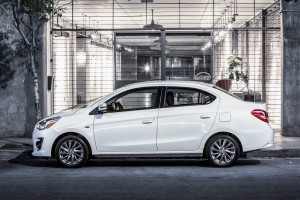The top two executives at Mitsubishi Motors Corp. are expected to resign in the wake of revelations that the sixth-largest Japanese automaker has been falsifying fuel economy data for as much as 25 years.
The company has acknowledged the scam, which was designed to make its microcar models more competitive in the mileage-minded Japanese market. But a new panel empowered to investigate the matter could reveal even more widespread cheating affecting vehicles sold beyond Japan’s borders.
The impact of the scandal is quickly being felt by Mitsubishi, the carmaker reporting its domestic sales have tumbled by half since the cheating was first reported. That is raising concerns for the survival of the maker which, only a few years ago, was pulled out of a financial tailspin by a consortium of Japanese banks.
MMC Chairman and Chief Executive Officer Osamu Masuko has already advised some dealers and parts suppliers of his plan to resign, the Yomiuri daily newspaper is reporting. A separate report in the Mainichi daily indicates President and Chief Operating Officer Tetsuro Aikawa will also leave the company.
“I feel a great responsibility” for the fuel economy scandal, said Aikawa, during a Tuesday news conference in Tokyo on Tuesday.
(Mitsubishi cheated on mileage numbers for 25 years. For more, Click Here.)
Aikawa also told reporters that the company has set up a panel of three lawyers, one a former government prosecutor, to continue an internal investigation launched earlier this month. They are expected to report back in three months. By then, the carmaker is also expected to announce a compensation plan for those who purchased vehicles that are getting lower mileage than they were promised.
“We don’t know the whole picture and we are in the process of trying to determine that,” the Mitsubishi CEO said.
The scandal was touched off earlier this month when Nissan questioned mileage data for several models it sells that are produced for it by Mitsubishi. It was quickly determined that the smaller automaker was falsifying fuel economy numbers for not only the Nissan Dayz and Dayz Roox microcars, but two of its own models, the Mitsubishi eK Space and eK wagon.
Though the vehicles are sold in Japan, where government mileage standards are based largely on urban stop-and-go driving, Mitsubishi engineers were using U.S. test procedures that involve more open highway driving. That artificially boosted the apparent mileage of the microcars, which are largely sold based on price and fuel economy.
(Click Here for more details about how the Mitsubishi scandal broke.)
What remains to be seen is whether Mitsubishi has also cheated on ratings for larger vehicles sold in other markets, such as the U.S. On Monday, the Consumer Federation of America noted that the Japanese maker’s products were among the most fuel-efficient available in the U.S. But CFA’s public affairs director Jack Gillis cautioned, “Those results now have to be suspect until (Mitsubishi’s) investigation is complete.”
Falsifying fuel economy data is a criminal offense in Japan, and one of Mitsubishi’s engineering centers already has been raided by government authorities. The Japanese Ministry of Transport has also ordered other automakers to provide fuel economy records as part of an investigation aimed at determining if the cheating scandal is more widespread.
“Of course we are complying with regulations,” Noriyoshi Matsushita, a senior managing executive at Daihatsu Motor Co., another microcar manufacturer, told reporters on Wednesday when asked if that maker were complying with fuel economy test guidelines.
The growing concerns in Japan echo what is happening in Europe and the U.S., where there is suspicion about whether diesel vehicle manufacturers have been complying with emissions standards. Last September, Volkswagen acknowledged it had cheated by rigging software that could determine whether a diesel model was being tested. If so, it would adjust engine settings to clean the exhaust.
(VW takes $18.2 bil hit for diesel scandal. But cost likely to rise. Click Here for the latest.)
Two class-action lawsuits have been filed this year alleging Daimler AG, parent of Mercedes-Benz, also cheated on diesel testing. And reports from Europe suggest Fiat Chrysler may have also used software subterfuge to rig tests.

